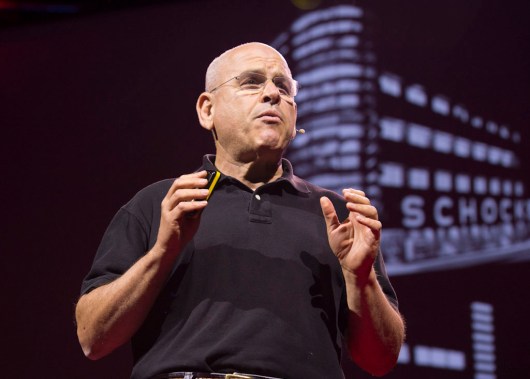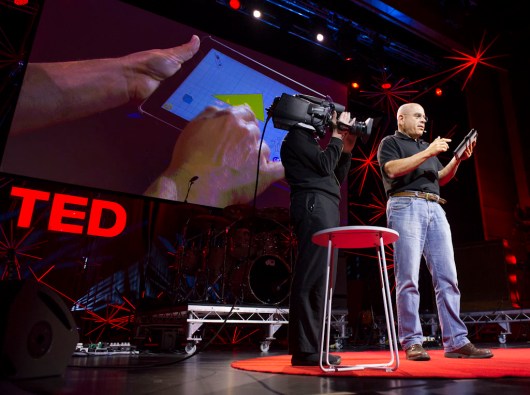Shimon Schocken is a professor and founding dean of the Efi Arazi School of Computer Science at IDC Herzliya in Tel Aviv. He starts out with some of his life story, introducing us to his grandfather, Salman Schocken, who dropped out of school aged 14 to help feed the family. He went on to found “a glittering empire of department stores,” every store building a “jewel of Bauhaus architecture.” Salman was the ultimate self-learner, a man who surrounded himself with an entourage of young, unknown scholars to enable their writing and learn from them. (The fact that said entourage included the likes of Franz Kafka likely didn’t hurt.)
In the late 1930s, Salman fled Germany, leaving everything behind and spending the rest of his life in a relentless pursuit of art and culture, ending his life as a scion of society. “Such is the power of self-study,” says Schocken, who goes on to introduce the next generation of Schockens, his parents, Gidon and Dvora. Likewise, neither went to university, but both were obsessed with reading and his house was stacked with thousands of books. “I remember my father telling us that when everyone in the neighborhood had a TV set, only then we will buy an FM radio.” He’s half-joking, if that.
His upbringing perhaps explains Schocken’s own obsession with self-study. Now he moves to tell us a story about a computer science course he developed with colleague Noam Nisan, because 12 years ago, they were frustrated by the same phenomenon: “students were losing the forest for the trees. It was impossible to connect with the soul of the machine.”
So what did they do? They developed a way to have students build a complete computer system from the ground up. You know. Obviously.
So Schocken and Nisan started with the “nand,” a simple logic gate with four input/output states. From here, students work through projects to build a series of objects, growing in complexity from the chipset to the hardware platform to the assembler to the virtual machine to the operating system to the compiler. By the end, students were playing games that they wrote themselves, on machinery they built. A triumph!
“Noam and I worked five years to facilitate this ascent and enable students to build it in one semester,” says Shocken. The trick, he adds, was to decompose computer construction into standalone modules that could be built and tested in isolation. Not only that, but all said building blocks were freely available on the web. “We laid out everything on the web and invited the world to take whatever they needed and do whatever they wanted with it. Then something fascinating happened. The world came–and in short order, they were building our machine.”
He gives examples. Pramode C.E. put together a group of self-learners in India. Parag Shah unbundled projects into even smaller projects in Mumbai. Many other different people have used the machine to execute very different ideas in very different ways. “For quite a few people, taking this Nand2Tetris pilgrimage has been a life-changing experience,” says Schocken, citing one student who describes himself as “profoundly changed” by his studies.
Here’s the important point. None of these students care a fig about grades. “They’re doing it for one motivation only: they had a passion to learn.” And with that Schocken takes on the thorny topic of grading. “I’m sick of it,” he says. “We’re obsessed with grades because we’re obsessed with data. But grading takes away from fun of failing.” It means that we don’t tolerate mistakes. “We collect B+’s and A-‘s and aggregate them into a number that sums up who you are and stamp it on your forehead.” It’s degrading, he says. Let’s talk about “upgrading” instead.
Now Schocken gives an onstage demonstration, showing a mobile app developed by his colleague Shmulik London to encourage children to play with math rather than worry about grades. He shows how it’s possible to have a fun, hands-on experience when calculating the area of shapes such as rectangles, parallelograms and triangles. It’s super cool. And imagine! The audience likes this very much.
So what’s next for Schocken and co.? First up, they’re deconstructing the K12 curriculum into a portfolio of apps similar to the one that he just demonstrated. They’ve developed an authoring tool to enable any teacher or parent to develop their own versions of activities, even without programming ability. And finally, they’re building an adaptable ecosystem to match different learners with different activities based on learning styles.
But what all this boils down to, he concludes, is that this isn’t really a matter of math. “In the end it’s all about people.” he says, before quoting some graffiti he once saw on the street in Tel Aviv. It said: “High tech, schmigh tech! The most important thing to be is a mensch.” Laughter, and applause.
Photos: James Duncan Davidson


Comments (3)
Pingback: Забудьте об оценках. Давайте повеселимся с математикой: Шимон Шокен на TEDGlobal 2012 | TED RUS
Pingback: Are you TED-worthy?